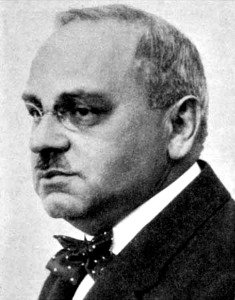Psychology Classics On Amazon

Alfred Adler
(Feb 7, 1870 - May 28, 1937)
Alfred Adler is quite rightly considered the first community psychologist. Decades ahead of it's time and rooted in social welfare, social justice, equality and the importance of education; Adlerian psychology, also known as individual psychology resonates as strongly today as it did when Adler began to articulate his ideas at the turn of the 20th Century.
Having graduated from the University of Vienna with a medical degree In 1895, Alfred Adler refused to see himself as simply a physician treating "sick" people. Driven by a strong desire and obligation to help prevent the suffering he saw all around him, Adler began to document the human consequences of social disadvantage, a concept we refer to today as "social exclusion."
In 1898 Adler published "Health Manual for the Tailoring Trade" and it is here that we see his pioneering ideas beginning to evolve. Adler witnesses at first hand the endemic health problems associated with desperately poor working and living conditions, noting that the workers he observed were “excluded from the cultural advantages and untouched by regulations governing hygiene.” Appalled by what he clearly saw as the unjustifiable human cost of working in the tailoring trade, Adler called for urgent reform through the provision of health and unemployment insurance, state inspections of working conditions and old age pensions etc.
In discussing "Health Manual for the Tailoring Trade" in an article on social exclusion, Hilary Silver notes that Adler proposed that inequality can give rise to hostility, aggression and violence; and conversely that social equality promotes mental health.
"The fact that individuals are members of communities shapes individual psychology and well-being. Multiple “life tasks” occupation/work, society/friendship, and love/sexuality – are interrelated, all contributing to individual self-esteem or feelings of inferiority or compensatory superiority-striving. Feeling that one is an equal member of a community and accepting social and moral constraints on the ideal self prevent what Adler identified as an “inferiority complex." (Hilary Silver, 2009)
Brilliant Newspaper Quote About Alfred Adler
Beyond Freud
Cursory accounts of Adler often point to his association with Sigmund Freud. For instance, Adler was the first president of the Vienna Psychoanalytic Society which he formed alongside Freud. However, it's important to note that Adler soon broke away from the psychoanalytic movement.
To understand the theoretical and more importantly the practical implications of this brake, look no further than André Tridon's excellent summary, which was as follows:
Freud considers human life as the result of the play of unconscious forces which drive us blindly and which we are in no way capable of leading or regulating. The repressed desires which are constantly seeking an outlet and which by creating an abnormal outlet for themselves upset at times our mental balance, serve no definite purpose. Jung, dissatisfied with this form, of psychological fatalism, contended that the neurosis was an unsuccessful attempt at adjusting one's conduct to the problems of the present. Adler thinks that all the forces of the individual are tending toward a definite goal and that in every manifestation of life we can find traces of a dominating or guiding idea.
In other words, Freud emphasized the importance of the past, Jung that of the present, Adler that of the future." (André Tridon 1920)
A Continuing Legacy
As alluded to above, feeling engaged and connected with one's community is a central tenet of Adlerian psychology. The psychological importance of "Social Interest" or "Gemeinschaftsgefühl" as Adler originally called it is as important today as its ever been.
Alfred Adler died in Scotland in May 1937 during a lecture tour in Aberdeen. Adler's friend and colleague Rudolf Dreikurs not only finished the tour but was also determined to ensure that Adler's ideas lived on.
"He is gone; but what he said will live. Let us be courageous and develop our social interest so that we will keep the flame burning which was kindled by Adler." (Rudolf Dreikurs)
In 1952, Rudolf Dreikurs in conjunction with the Individual Psychology Association of Chicago founded the Alfred Adler Institute of Chicago. Renamed the Adler School of Professional Psychology in 1991, its mission remains to continue "the pioneering work of the first community psychologist Alfred Adler by graduating socially responsible practitioners, engaging communities, and advancing social justice."
Alfred Adler Articles
Adler, Individual Psychology By André Tridon
(Photo Credit: Saylow via flickr creative commons)
Adler, Individual Psychology By André Tridon was first published in 1920 and offers a clear and concise account of the theories of Alfred Adler, including details of his major points of disagreement with Sigmund Freud. You can read this excellent article via the following link.
Adlerian Psychology: 8 Basic Principles By Nita Arnold
Great article from 1951 outlining 8 Basic Principles of Adlerian Psychology, which you can read via the following link.
This stylish Alfred Adler Heart Shape Word Cloud T-Shirt is perfect for anybody with an interest in Adlerian psychology. Also ideal for helping to promote Adler's groundbreaking concept of social interest "Gemeinschaftsgefühl"; i.e., the importance of feeling engaged and connected with one's community, which is as relevant today as it has ever been. Sales help support All-About-Psychology.Com which has been providing free and comprehensive information and resources for psychology students and educators since 2008.
Recent Articles
-
Sponsor a Psychology Website with Over a Million Yearly Visitors
Jun 30, 25 11:30 AM
Showcase your brand to a huge, engaged audience. Discover how to sponsor a psychology website trusted by over a million visitors a year. -
Unparalleled Psychology Advertising Opportunities
Jun 29, 25 04:23 AM
Promote your book, podcast, course, or brand on one of the web's leading psychology platforms. Discover advertising and sponsorship opportunities today. -
Psychology Book Marketing
Jun 29, 25 04:19 AM
Psychology book marketing. Ignite your book's visibility by leveraging the massive reach of the All About Psychology website and social media channels.
Please help support this website by visiting the All About Psychology Amazon Store to check out an awesome collection of psychology books, gifts and T-shirts.
Go To The Psychology Pioneers Page









New! Comments
Have your say about what you just read! Leave me a comment in the box below.